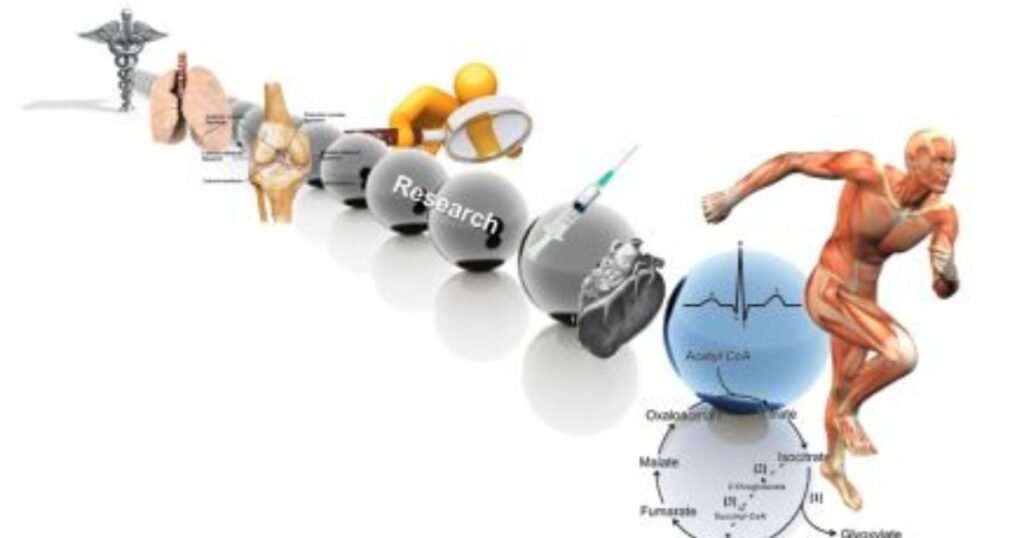Introduction: Understanding Exercise Medicine
Exercise medicine focuses on the use of physical activity and exercise as a means to promote and maintain good health. It involves various forms of exercise, from aerobic activities like jogging and swimming to strength training exercises such as weightlifting. Exercise medicine is supported by extensive research and is recommended by healthcare professionals worldwide as an essential component of a healthy lifestyle.
Read More: Dementia and Cognition
Exercise and Weight Control
One of the primary benefits of exercise is its ability to control weight. Engaging in physical activity helps burn calories, which is crucial for weight maintenance or weight loss. Even small amounts of exercise throughout the day, such as taking the stairs instead of the elevator or doing household chores, can contribute to calorie expenditure. To fully benefit from exercise, consistency is essential.

The Link Between Exercise and Health Conditions
Regular exercise has a significant impact on preventing and managing various health conditions. It improves cardiovascular health by increasing good cholesterol levels and decreasing triglycerides, reducing the risk of heart disease and stroke. Exercise also aids in the management or prevention of illnesses like high blood pressure, type 2 diabetes, depression, anxiety, arthritis, and some cancers. Additionally, it enhances cognitive function and lowers the risk of death from all causes.
Exercise for Mood Enhancement
Exercise is a powerful tool for boosting mood and emotional well-being. Physical activity stimulates the release of endorphins and other brain chemicals that promote happiness and relaxation. Exercise on a regular basis might help you feel less stressed, anxious, and depressed, giving you a better outlook on life.
Boosting Energy Levels through Exercise
If you often feel tired and weary, exercise can be your solution. Regular exercise increases muscle strength and endurance, improving the efficiency with which oxygen and nutrients are delivered to your tissues. As your cardiovascular health improves, you’ll notice an increase in energy levels, allowing you to tackle daily tasks with vigour and vitality.
The Impact of Exercise on Sleep Quality
If you struggle with sleep problems, exercise can help promote better sleep. Physical activity has been shown to regulate sleep patterns and improve sleep quality. Exercise can help you sleep more soundly and rejuvenatingly so that you can wake up feeling rested and ready to take on the day.

Exercise and Brain Health
Exercise is not only beneficial for the body but also for the brain. Regular exercise has been shown to enhance memory, cognitive function, and general brain health. It stimulates the growth of new neurons and enhances blood flow to the brain, contributing to better mental clarity and sharper cognitive abilities.
Exercise and Longevity
Want to live a longer, healthier life? Exercise can play a vital role in promoting longevity. Regular physical activity lowers the chance of dying too young, according to studies. Incorporating exercise medicine into your lifestyle can increase your chances of living a long and fulfilling life.
Exercise for Stronger Bones and Muscles
Exercise helps strengthen bones and muscles, reducing the risk of osteoporosis and age-related muscle loss. Weight-bearing exercises like walking or weightlifting stimulate bone formation while strength-training exercises increase muscle mass and improve overall muscle function. By incorporating these activities into your exercise routine, you can promote skeletal and muscular health.

Enhancing Cardiovascular Health through Exercise
Swimming, cycling, and running are all beneficial exercises. aerobic exercise that are extremely beneficial for cardiovascular health. It increases blood flow, strengthens the heart muscle, and decreases blood pressure. According to the World Health Organization, participating in aerobic exercise for at least 150 minutes a week can greatly lower the risk of developing heart disease and other cardiovascular diseases.
Exercise as a Stress Reliever
Exercise serves as an excellent stress reliever. Physical activity helps release tension, clears the mind, and promotes a sense of calm and relaxation. Whether it’s a vigorous workout at the gym or a gentle yoga session, exercise provides an outlet for stress and helps improve overall mental well-being.
Exercise for Improved Flexibility and Balance
Incorporating stretching exercises and activities like yoga or tai chi into your exercise routine can enhance flexibility, balance, and coordination. These exercises promote joint mobility, prevent injuries, and improve physical performance. By maintaining flexibility and balance, you can maintain independence and reduce the risk of falls, particularly as you age.
Exercise for Disease Prevention
Exercise plays a crucial role in preventing various diseases. From lowering the occurrence of specific cancers to lowering the risk of cardiovascular illnesses and type 2 diabetes, regular physical activity acts as a protective shield for your overall health. Adopting an exercise medicine approach can significantly reduce the chances of developing chronic diseases.
The Role of Exercise in Managing Chronic Conditions
Exercise medicine is a valuable tool in managing chronic conditions. For individuals with conditions such as arthritis or chronic pain, engaging in appropriate physical activities can help alleviate symptoms, improve joint function, and enhance the overall quality of life. Working closely with healthcare professionals to develop tailored exercise programs that address specific needs and limitations is essential.

Read More: Exercise Medicine
Conclusion
Exercise medicine offers a multitude of benefits for both physical and mental well-being. Regular physical activity is the key to unlocking a healthier, happier life, from weight control and disease prevention to mood enhancement and improved sleep. So, take a step towards a better future by including exercise in your regular routine and discovering the healing potential of exercise.
FAQs
How much exercise should I aim for each week?
75 minutes of strenuous activity or 150 minutes or more of aerobic activity at a medium intensity per week are advised by the World Health Organization.
Can exercise help with weight loss?
Yes, exercise can contribute to weight loss by burning calories and increasing metabolism.
Is exercise safe for individuals with chronic conditions?
Exercise can be safe and beneficial for individuals with chronic conditions. It is important to consult with healthcare professionals to develop an appropriate exercise plan.
What are some examples of aerobic exercises?
Aerobic exercises include running, cycling, swimming, and dancing.
How does exercise improve mental health?
Exercise stimulates the release of endorphins, known as “feel-good” hormones. This can improve mood, reduce stress, and alleviate symptoms of depression and anxiety.
What is exercise as medicine?
Exercise as medicine is a public health initiative encouraging people to be physically active. It is predicated on the notion that exercise can be as efficient as medicine in preventing and treating chronic illnesses.
Why is the exercise called medicine?
Exercise is medicine because it has many benefits as traditional medicine. It can help to prevent and treat diseases, improve mood, and boost energy levels.
Is exercise medicine for mental health?
Yes, exercise is a medicine for mental health. It can aid in lowering anxiety, despair, and stress. It can aid in lowering anxiety, despair, and stress.
Is exercise a natural medicine?
Yes, exercise is a natural medicine. It is a safe and effective way to improve your health without the side effects of prescription medications.
Is exercise better than medicine?
In some cases, exercise can be better than medicine.
For instance, exercise can aid in the prevention of two of the main causes of death in the US: heart disease and stroke.
Who said exercise is medicine?
The phrase “exercise is medicine” was first used by Dr James O. Hill, a professor of exercise science at the University of Colorado.
To increase awareness of the value of physical activity, he coined the phrase in the early 2000s.
What are the 10 benefits of exercise?
Exercise has various advantages, including a lower chance of chronic illnesses like heart disease, stroke, type 2 diabetes, and cancer.
Improved mood and mental health
Increased energy levels
Weight loss or maintenance
Stronger bones and muscles
Improved balance and coordination
Better sleep
Increased lifespan
Reduced risk of falls
Who is the father of exercise?
There is no single “father of exercise,” but some of the most important figures in the history of exercise include:
Hippocrates, a Greek physician regarded as the “father of medicine,”
Galen, the Greek physician who wrote extensively about the benefits of exercise
James O. Hill, the professor who coined the phrase “exercise is medicine.”
Kenneth Cooper, the doctor who developed the Cooper Aerobics program
Bill Pearl, the bodybuilder who wrote extensively about the benefits of strength training
Why exercise is the best medicine?
Exercise is the best medicine because it is safe, effective, and affordable. It can help prevent and treat many chronic diseases and improve mood, energy, and overall health.
When exercise is a medicine quote?
“Exercise is the best medicine you can give yourself.” – Kenneth Cooper
What are the 5 principles of fitness?
The 5 principles of fitness are:
Aerobic fitness: Your heart and lungs can provide your muscles with oxygen.
Muscular strength: This is the ability of your muscles to exert force.
Your muscles’ endurance is their capacity to exert force continuously over an extended period.
Flexibility: This is the ability of your joints to move through their full range of motion.
Body composition: This is the fat-to-muscle ratio in your body.
What definitions of exercise?
There are many different definitions of exercise, but some of the most common include:
Any bodily movement that requires energy expenditure
Any activity that increases your heart rate and breathing rate
Any activity that challenges your muscles and joints






